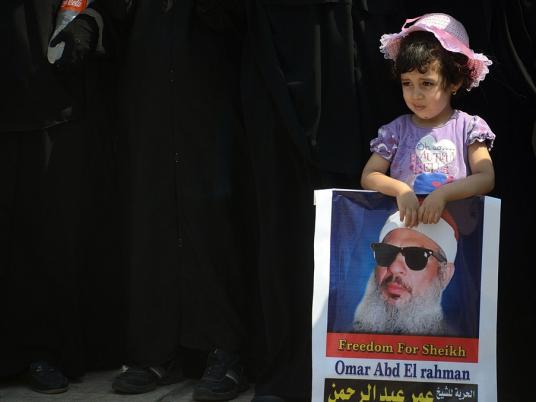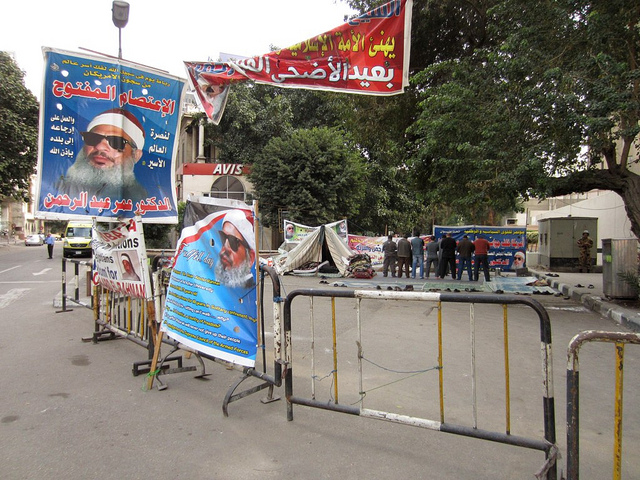So Aboud al-Zomor is looking for an end to the crisis? Zomor is one of the Islamist leaders who know quite well how strong the army is, having once served as an army leader and at military intelligence before his involvement in the assassination of former President Anwar Sadat. If he had not been fired, he would have been a major general in the army today.
Zomor is aware of the losses the Muslim Brotherhood are incurring by continuing their struggle with the army.
He has recently waged war on the leaders of Jama’a al-Islamiya in order to dissuade his supporters from engaging in a battle that he knows the Brotherhood will eventually lose. But he always failed because the Jama’a’s “hawks” wish to restore the group’s status in the 1990s when it fought openly with the security forces as well as the state. But even then the group had to sit at the negotiating table with security in order to stop the bloodshed of its members over the years.
Zomor won the first round when Jama’a al-Islamiya’s Shura Council voted in favor of leaving the National Alliance in Support of Legitimacy. Other leaders, like Safwat Abdel Ghany and Essam Derbala, wanted Jama’a to remain part of the alliance and to defend the return of ousted President Mohamed Morsy until the last breath.
He suggested that the group enter into negotiations with the army to call for releasing all its arrested members and not pursuing Assem Abdel Maged and other group leaders.
Zomor then retracted his remarks when security authorities rejected Islamist statements and said rule of law would form the basis of new relationships with Islamist groups.
Even though Zomor leaked the news that Jama’a left the alliance to a news agency to embarrass the leadership and pressure them to implement what had been agreed on, he took a few steps back after failing to achieve any success in his negotiations with the military.
Zomor emerged from those negotiations empty-handed but he still launched a fresh initiative, similar to the one proposed by Jama’a al-Islamiya in 1997 when it suggested a unilateral, unconditional halt on all operations. However, this time, the goal is to preserve the Islamist current rather than his life or Jama’a al-Islamiya – as was the case in the 1990s.
Islamist groups are looking for a way out of the current political crisis but do not have the tools to do so, particularly when security forces insist on implementing the law and combating terrorism backed by widespread popular support. Zomor is trying to end the crisis while the Brotherhood are incapable of taking initiatives or negotiating simply because their decision makers are in prison while Jama’a al-Islamiya’s leadership, who are not in prison, are not in a position to make amends to Zomor’s decisions. As such, deadlock remains.
Zomor’s initiative was based on the logic that Jama’a al-Islamiya should not continue to defend the Brotherhood in a lost battle and that the group’s members should not spend the rest of their lives in prison. Zomor, a member of Jama’a’s Shura Council and a former jihad leader, leaked his initiative to the media before discussing it within the group to have it approved by winning popular support for it which would put pressure on Jama’a to accept it.
Zomor said he might stop demanding the return of the legitimate president in exchange for stopping detentions and trials and giving the Islamist current another chance and not smearing its image in the media. He called for the members of Jama’a to withdraw from the pro-Morsy alliance after failing to persuade the Brotherhood to accept any initiative he put forward..
Wassat and Watan are two parties that accept Zomor’s initiative. Both believe the Brotherhood is waging an unwinnable – if not already lost – war against state bodies which have the support of the people. If they have already lost the battle, they will lose the war by continuing to struggle the same way, the two parties claim. This position may be attributed to the fact that Watan is a Salafi party that does not favor confrontation or violence. The Wassat Party, on the other hand, brings together members of the Islamist current who broke off from organisations that were pursued by security forces and, like Watan, it favors appeasement.
Is Zomor’s initiative going to succeed or fail like the dozens other initiatives that were proposed? And who pays the prices for the failure of all those initiatives? It may be difficult to answer both questions now but time should tell us when the Brotherhood either chooses to escalate actions through more protests or accepts dialogue with the political leadership.



